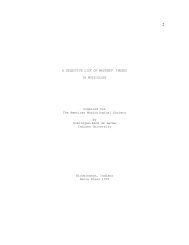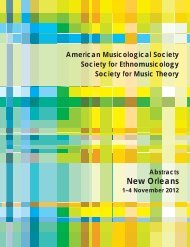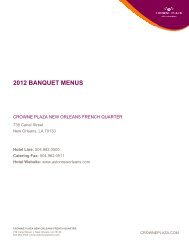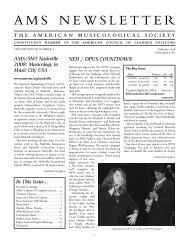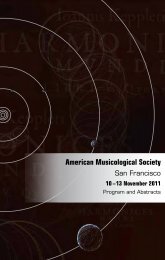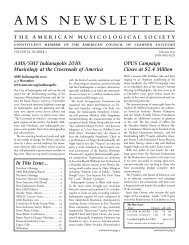AMS Philadelphia 2009 Abstracts - American Musicological Society
AMS Philadelphia 2009 Abstracts - American Musicological Society
AMS Philadelphia 2009 Abstracts - American Musicological Society
You also want an ePaper? Increase the reach of your titles
YUMPU automatically turns print PDFs into web optimized ePapers that Google loves.
<strong>Abstracts</strong> saturday morning 113<br />
“KITTEN ON THE KEYS”: FROM PLAYER PIANOS TO<br />
POETISM, OR HOW NOVELTY PIANO CAME TO PRAGUE<br />
Derek Katz<br />
University of California, Santa Barbara<br />
Jazz, Ragtime and <strong>American</strong> dance music permeate the life and works of Erwin Schulhoff,<br />
from the foxtrot that begins the 1919 Fünf Pittoresken for piano to his writings about jazz for<br />
der Auftakt in the mid-1920s and his performances as pianist for the cabaret orchestra of the<br />
Liberated Theater in the early 1930s. These compositions and activities are rich in aesthetic<br />
and political associations. The earliest works, written under the sway of the George Grosz<br />
circle in Berlin, were intended as Dada provocations. After returning to Prague in 1923, Schulhoff<br />
attempted both to fuse popular and art musics and to provide a musical component of<br />
the “laughing world” promoted by Karel Teige and the Prague Poetists. Schulhoff’s sources for<br />
his conception of jazz ranged from the music that he danced to in bars to the symphonic jazz<br />
of Paul Whiteman. Around 1926, though, Schulhoff’s main enthusiasm was for the “novelty<br />
piano” style of Zez Confrey, to whom the first of Schulhoff’s Jazz-etuden was dedicated, and<br />
whose “Kitten on the Keys” was the basis of the toccata that concludes the set.<br />
Although only present on the peripheries of recent histories of jazz and ragtime, Confrey’s<br />
rags were enormously popular and influential in the 1920s. Confrey shared top billing with<br />
George Gershwin at Whiteman’s notorious 1924 Aeolian Hall concert, and “Kitten on the<br />
Keys” sold over a million copies within a year of its publication in 1921, eventually becoming<br />
the second best selling rag of all time. For many composers and critics, like Aaron Copland,<br />
Gilbert Seldes and Henry Osgood in America, and Schulhoff, Alfred Baresel and Theodor<br />
Adorno in Europe, Confrey’s compositions were representative of the best and most recent<br />
developments in jazz piano. Although his rags eventually sold well as sheet music, Confrey<br />
wrote his most famous works while in the employ of the QRS piano roll company. Their<br />
heritage as fodder for player pianos is preserved both in titles like “You Tell ’em Ivories” and<br />
by rapid tempi and flashy figuration that foregrounded the automatic mechanism and supradigital<br />
dexterity of the player piano. Confrey referred to his style as “Modern,” and it shared<br />
the harmonic characteristics, including chromatically descending parallel ninth chords and<br />
extended passages in parallel fourths, of “modernistic” jazz compositions by composers from<br />
Matty Malneck to James P. Johnson; characteristics that were loosely derived from European<br />
Impressionist compositions.<br />
Schulhoff’s infatuation with novelty piano provides an addition to standard accounts of<br />
the transmission of jazz and dance music from America to Europe and of jazz’s functions as a<br />
social signifier. Schulhoff depended on sheet music and etude books, exploiting a repertoire<br />
attractive for its associations with mechanical reproduction and use of stylistic devices derived<br />
from European art music. This allowed Schulhoff, however briefly, to create music that both<br />
paid homage to jazz as part of the fashionable modern life promoted by the Prague avantgarde<br />
and that was consistent with the more hermetic stylistic modernism of the art music<br />
world.



